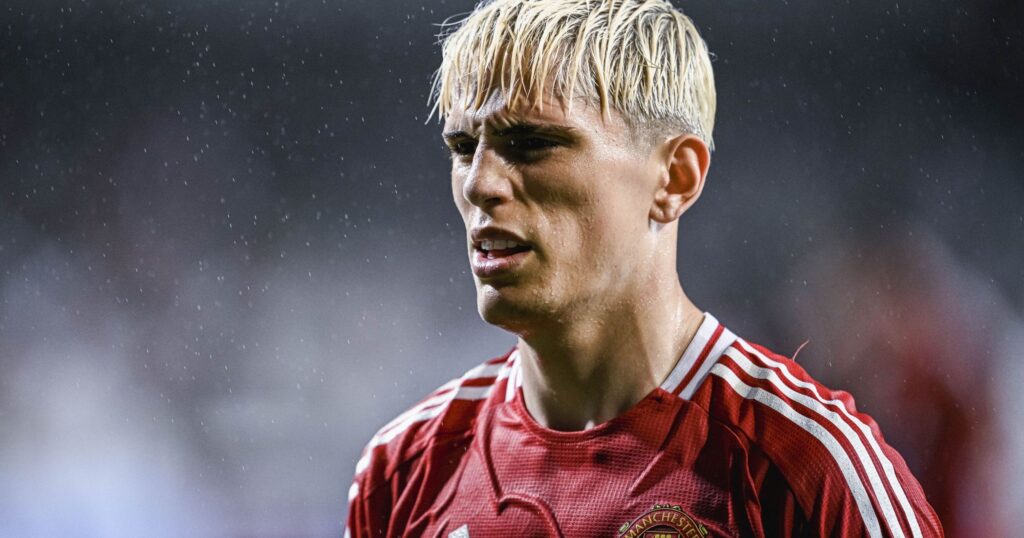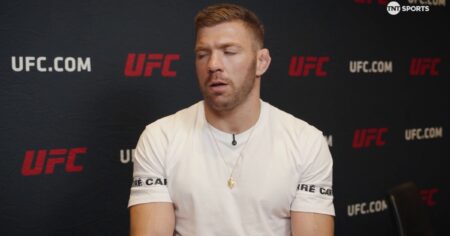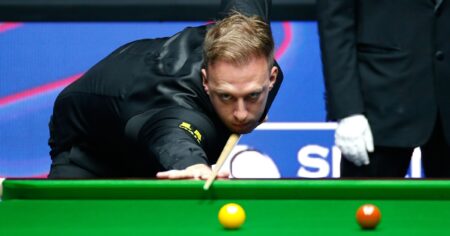In a recent turn of events, Manchester United appears poised to adjust their strategy regarding the sale of young forward Alejandro Garnacho, whose future at Old Trafford has become increasingly uncertain. The club is reportedly willing to entertain offers that fall below their initial valuation of £60 million. This shift comes in light of Garnacho’s controversial choice to don an Aston Villa shirt emblazoned with the name of star player Marcus Rashford, a move that has intensified the scrutiny surrounding his position within the squad.
Despite the lack of a formal statement from the club, insiders suggest that Garnacho’s provocative gesture has only reinforced the club’s eagerness to part ways with him. The friction between the player and head coach Ruben Amorim has also contributed to the club’s readiness to negotiate a lower transfer fee. While the initial £60 million figure may seem ambitious, especially in light of the public fallout, a more realistic expectation for Manchester United could center around £40 million. This amount would still represent a significant profit in alignment with financial sustainability regulations, given that Garnacho is an academy product who joined the Red Devils from Atletico Madrid as a teenager in 2020.
This scenario illustrates the unpredictable nature of transfers—a landscape where player behavior and public perception can have significant financial implications. Amorim’s comments reflect the uncertainty surrounding Garnacho’s future, further indicating the transitional phase the club is undergoing as they look to revamp their roster.
In parallel, Manchester United’s focus extends beyond Garnacho, with the club actively monitoring the situation of Diogo Costa, the goalkeeper for FC Porto. After another inconsistent season from Andre Onana, United is keen on securing a reliable new shot-stopper as they aim to fortify their squad ahead of the upcoming season. Reports suggest that Costa is on the verge of leaving the Portuguese league, a development that could work in Manchester United’s favor. Not only are they interested, but they also face competition from crosstown rivals Manchester City, making the race for Costa’s signature steep. With a release clause set at £64 million, securing the talented goalkeeper could present both a challenge and a potential turning point for United this summer.
Turning attention to rival clubs, Arsenal appears to be reevaluating their options in their pursuit of a striker, particularly amidst drawn-out negotiations with RB Leipzig regarding Benjamin Sesko. The Gunners have openly expressed interest in the young forward, but reports indicate that Leipzig is playing hardball, fully aware of Arsenal’s pressing need for striking reinforcements. The concern is that rising tensions and inflated prices could derail their plans.
As Arsenal maintains a degree of flexibility in its approach, sporting director Andrea Berta is exploring alternatives, including Viktor Gyokeres from Sporting Lisbon. Although Gyokeres has garnered attention due to his impressive goal tally in the Primeira Liga, concerns linger regarding the player’s ability to transition effectively to the more rigorous environment of the Premier League. Consequently, Berta’s strategy aims to avoid overpaying for either striker, demonstrating a more measured approach compared to his predecessor.
In another twist, both Manchester United and Everton have expressed interest in Leicester City’s midfielder Wilfred Ndidi, whose position has been affected by Leicester’s recent relegation to the Championship. With a contract that includes a £9 million release clause due to the club’s drop in league status, Ndidi represents a tempting option for both teams seeking to bolster their midfield. His experience and track record as a defensive midfielder make him an appealing target, especially considering the potential to acquire him at a reduced price.
In conclusion, the current transfer window presents a plethora of strategic challenges for several clubs, specifically Manchester United and Arsenal, as they navigate player valuations and negotiations. The ability to secure desired transfers while managing financial prudence will be vital for shaping the upcoming season’s squad dynamics. Each decision made in this complex landscape could have far-reaching implications, both on and off the pitch, as clubs strive for competitive advantage in an ever-evolving football environment.












